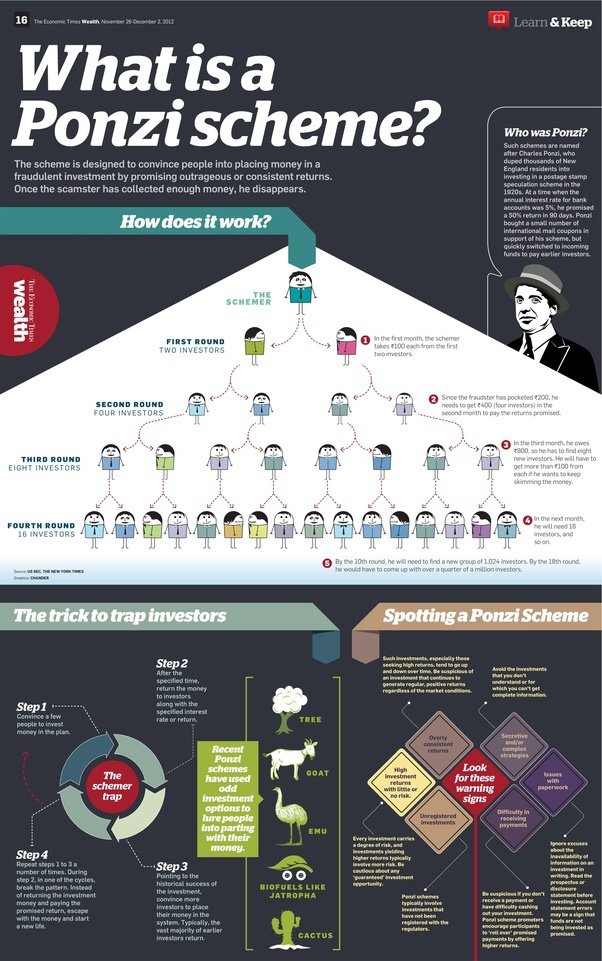Positively Identifying Pyramid Schemes
If this is the first time you’ve heard the term “pyramid scheme,” prepare yourself. In this article, we’ll help you become confident in positively identifying pyramid schemes. Also, we will describe some of the primary differences between pyramid and Ponzi schemes as well as warning signs to look out for.
Pyramid Schemes
First, when it comes to pyramid schemes, they’re fraudulent ways of making money based on constantly recruiting “investors.” It gets its name, “pyramid” because at each level, the number of investors grows. These schemes promise easy riches earned by promoting and marketing of goods and services. Those on top of the pyramid are often entrepreneurs or social media influencers.
Ponzi Schemes
Second, Ponzi schemes got their name from the notorious swindler Charles Ponzi, who scammed investors out of millions of dollars. Though he was not the first, his name is immortalized and has been put into play even within the last 20 years – when Bernie Madoff collected around $17 billion from 5,000 investors.
Ponzi schemes often make promises of grandeur returns, and may involve a secretive strategy. At face value, while it may look like the account balance on your bank account is rising, the crook at the top is pocketing most of it, possibly issuing phony paperwork and covering up the ruse by using cash from other investors.
Without a solid structure and infrastructure that allows for scalability, the scheme becomes harder to sustain and ultimately collapses in the end.
Multi-Level Marketing
When it comes to “multi-level marketing” practices, some companies are successful, while some are only just surviving. It’s important to note that multi-level marketing is a legitimate practice that involves selling products directly to consumers without retail stores. Then, products are sold through a network of distributors or salespersons compensated by recruitment and sales.
Pyramid scheme vs. Multi-Level Marketing (MLM)
Here are some of the key points that differentiate pyramid schemes from MLM companies. Even in small pyramid schemes, the vast majority of members lose money.
- Participants receive reduced rates and fees for convincing recruits to join
- Members may be asked to buy and sell products
- New participants are encouraged to recruit new members to pay fees to join
- Company will pay for its participants for selling its products or services
- Recruitment is not required
- Recruitment may help participants earn more money
Well Known Real Life Examples
Next, we’ll look at some of the more well known examples of multi-level marketing companies.
In her anti-MLM blog post, Dani covers her opinion on whether or not large makeup producer, Avon, is a large-scale pyramid scheme. While she doesn’t get down to a yes or no, she makes many good points about how we can learn from observation: even in recent years (2009), Avon was still aggressively recruiting new sales members in a declining market.
One of my personal favorite MLM stories is about fashion startup, LuLaRoe. In 2016, many women joined as LuLaRoe consultants, paying thousands of dollars in startup fees with the hope they will be “living the dream” by working from home and achieving financial freedom. However, it turned out to be a great example of how this startup ended up taking the most possible from its consultants, leaving them on the hook with tons of unsold products, high amounts of debt, and numerous lawsuits.
According to Elle Beau in MLM Truth, in 2017, the members of the Anti-MLM Coalition joined to expose lies and corruption in the multi-level marketing industry. In particular, they took aim at “one of the largest direct sellers of advanced skincare and on-trend color in the world,” Mary Kay. Another group, the Pink Truth (formerly known as Mary Kay Sucks), founded in 2006 touting Mary Kay is a product-based pyramid scheme.
Fourth on our list, Metabolife, was founded in the early 1990s in San Diego, California. Both founders were convicted felons that had both served sentences for manufacturing methamphetamine. The duo stated their product, Metabolife 365, was originally targeted at bodybuilders, but later was rebranded as a weight loss and diet supplement. Though it was dissolved in 2005, Metabolife lives on in another form: TwinLab.
An expert reviewer that goes by “Elijah” from ScamRisk performed a Scam Risk Report on Pampered Chef in 2021 here. In it, ScamRisk goes over things that they liked about it versus things that they weren’t fans of – like the pushing of sales to friends and family and unrealistic expectations.
In Conclusion
Ultimately, when deciding whether or not to join an MLM, you must exercise caution and ask yourself: do you want to be a salesperson? Do you have a solid sales plan in place, and a network of friends and family who will buy these products from you repeatedly? Last, can you afford to risk the money and time? Hopefully, now you feel you can positively identify pyramid schemes.
When you make the call – remember you’re checking out potential deals, duds, or even illegal operations. Trust your intuition and rely on your research.
Resources & Further Reading
AARP. (2021, September 1). Ponzi vs. pyramid scheme: What’s the difference? AARP. Retrieved October 12, 2021, from https://www.aarp.org/money/scams-fraud/info-2021/ponzi-vs-pyramid-schemes.html.
Don’t get caught in a pyramid scheme. Don’t Get Caught in a Pyramid Scheme | New York State Attorney General. (n.d.). Retrieved October 12, 2021, from https://ag.ny.gov/consumer-frauds/pyramid-schemes.
Multi-level marketing businesses and Pyramid Schemes. Consumer Information. (2021, May 27). Retrieved October 12, 2021, from https://www.consumer.ftc.gov/articles/multi-level-marketing-businesses-and-pyramid-schemes.
YouTube. (2019). How to spot a pyramid scheme – Stacie Bosley. YouTube. Retrieved October 12, 2021, from https://www.youtube.com/watch?v=SBGfHk91Vrk.
Recent Posts
The Success Series: How to Leverage Storytelling in Interviews
Learn how to categorize your work and personal experience so...
Read MoreGreat Tech Deals for Amazon Prime Day 2024
Great Tech Deals – Amazon Prime Day 2024 This post...
Read MoreQuick Guide to Google Search
What’s New in Google Search? If you own a business,...
Read MoreMicrosoft Edge’s New RAM Slider
What the RAM Slider Will Do Twitter (now X) user...
Read More




